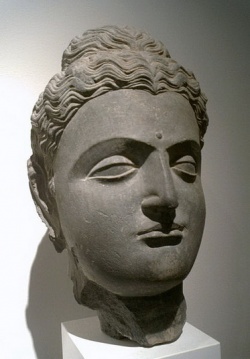Difference between revisions of "Gandara"
Jump to navigation
Jump to search
(Created page with " Gandara (Old Persian Gandâra): name of a satrapy of the ancient Achaemenid Empire, roughly equivalent to the valley of the river Cophen (modern Kabul). The Greeks called the...") |
|||
| Line 1: | Line 1: | ||
| − | + | [[File:BuddhaHead.JPG|thumb|250px|]] | |
| − | Gandara (Old Persian Gandâra): name of a satrapy of the ancient Achaemenid Empire, roughly equivalent to the valley of the river Cophen (modern Kabul). The Greeks called the western part this region Parapamisos, which may be derived from the old Old Persian name of the Hindu Kush mountain range, Upairisaena (mentioned in the Avesta, Yasna 10). Culturally, Gandara belonged to the Indian, not to the Persian | + | Gandara (Old Persian Gandâra): name of a satrapy of the ancient Achaemenid Empire, roughly equivalent to the valley of the river Cophen (modern Kabul). The [[Greeks]] called the western part this region Parapamisos, which may be derived from the old Old Persian name of the Hindu Kush mountain range, Upairisaena (mentioned in the Avesta, Yasna 10). Culturally, Gandara belonged to the Indian, not to the Persian [[World]]. |
{{R}} | {{R}} | ||
[http://www.livius.org/ga-gh/gandara/gandara.html www.livius.org] | [http://www.livius.org/ga-gh/gandara/gandara.html www.livius.org] | ||
[[Category:Buddhist Terms]] | [[Category:Buddhist Terms]] | ||
[[Category:History of Buddhism]] | [[Category:History of Buddhism]] | ||
Revision as of 00:14, 14 April 2013
Gandara (Old Persian Gandâra): name of a satrapy of the ancient Achaemenid Empire, roughly equivalent to the valley of the river Cophen (modern Kabul). The Greeks called the western part this region Parapamisos, which may be derived from the old Old Persian name of the Hindu Kush mountain range, Upairisaena (mentioned in the Avesta, Yasna 10). Culturally, Gandara belonged to the Indian, not to the Persian World.
